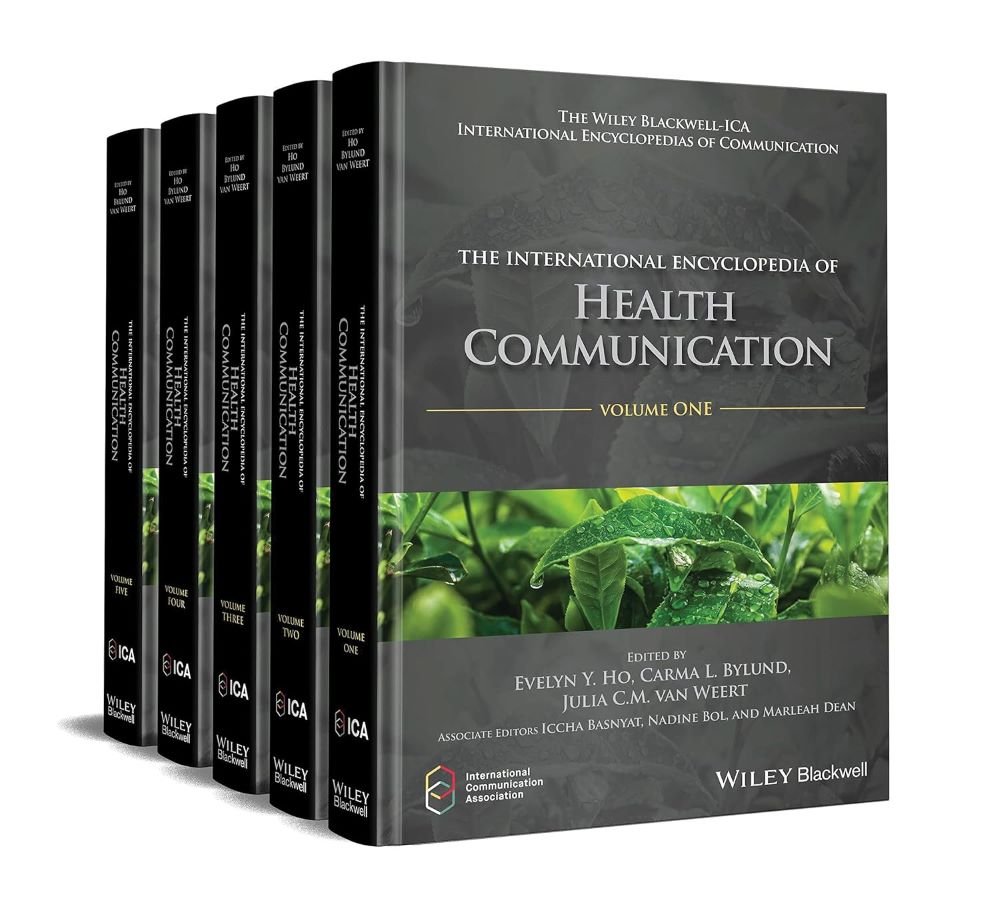Collection Spotlight: the International Encyclopedia of Health Communication

by Michael Pasqualoni, Librarian for the Newhouse School of Public Communications
From publisher Wiley Blackwell and the International Communication Association comes The International Encyclopedia of Health Communication, a five-volume work considered a definitive scholarly reference title. This substantial eBook released in 2023 contains diverse international authors addressing a wide array of subjects. Syracuse University’s Professor of Communications at the Newhouse School, Srividya Ramasubramanian, contributes two chapters: (1) one entitled CIH (Complementary and Integrative Healthcare): Mindfulness/Meditation, and (2) another co-authored with Emily Riewestahl on Trauma-Informed Approaches. Reflecting on this resource, Professor Ramasubramanian reminds:
As the global COVID-19 pandemic has taught us, it is not enough if there is excellent health-related scientific knowledge out there. It is as important, or even more important, to be able to communicate relevant health information in a culturally-inclusive manner to our communities. It is within this larger context that this encyclopedia that focuses on health communication will be immensely beneficial to people from many different backgrounds such as communication, media studies, rhetoric, medicine, nursing, nutrition, healthcare administration, dentistry, kinesiology, and allied health fields. It covers a broad range of topics such as health literacy, patient-provider interactions, healthcare systems, mental health, sexual health, and disabilities.
(S. Ramasubramanian, personal communication, January 9, 2024)
Hua Jiang, also from Newhouse School and an Associate Professor of Public Relations, contributes a chapter entitled Chatbots and Health: Mental Health, co-authored with North Carolina State University’s Yang Cheng and Chenxing Xie, together with Yanding Wang of China Medical University.
Students and faculty originating from widely disparate sets of Syracuse University programs, academic departments, and schools or colleges will find within this reference source numerous relevant discussions. Spanning over 450 concise chapters and associated reference lists useful for follow-up investigation, these can be used to explore topics such as health technologies, nutrition related subjects, vaccination hesitancy, crisis communications, human-animal interaction, multiple chapters on advertising (e.g., of food, alcohol or prescription drugs), as well as a large number of chapters that tackle various aspects of health related communication in the context of issues of diversity and inequality.
Like research efficiencies from reference sources featured in the recent SU Libraries blog post on Supercharging Scholarly Literature Reviews, which touted upsides of the titles, Oxford Handbooks Online and Annual Reviews – the International Encyclopedia of Health Communication is another set of synthesizing source material helpful to many researching within health subject areas. While each chapter is not offering the length of literature review essays associated with the other two titles, a stand-out strength of International Encyclopedia of Health Communication is its collation of hundreds of sub-topics intersecting with health-related communications and similar opportunities and challenges. These hundreds of overviews with extensive citations to additional published sources are notable for the wide globally diverse perspectives of international authors and editors. In describing her contributions to this encyclopedia, Newhouse School’s Professor Ramasubramanian remarks on the need for this kind of specialized title:
I was invited to submit two entries for this encyclopedia. I agreed immediately because the co-editors, Drs. Iccha Basnyat and Evelyn Ho, are leading health communication scholars whose work is admired in the discipline. Additionally, the topics that I was asked to write about, trauma-informed care and mindfulness, are often neglected within Western-centric health communication. It was an opportunity for me to write about non-Western systems of medicine. In the entry on mindfulness, I wrote about the mind-body complex and the importance of incorporating ancient wisdom from yoga and meditation into contemporary healthcare. Similarly, with the entry on trauma-informed healthcare, my co-author Emily Riewestahl and I discuss patient-centered approaches to healthcare. We advocate for healthcare providers to be flexible and culturally-inclusive in their approaches to care. We emphasize the importance of creating spaces for patients to share their voice, stories, and cultural practices in affirming ways.
(S. Ramasubramanian, personal communication, January 9, 2024)
To provide feedback or suggest a title to add to the SU Libraries collection, please complete the Resource Feedback Form.
